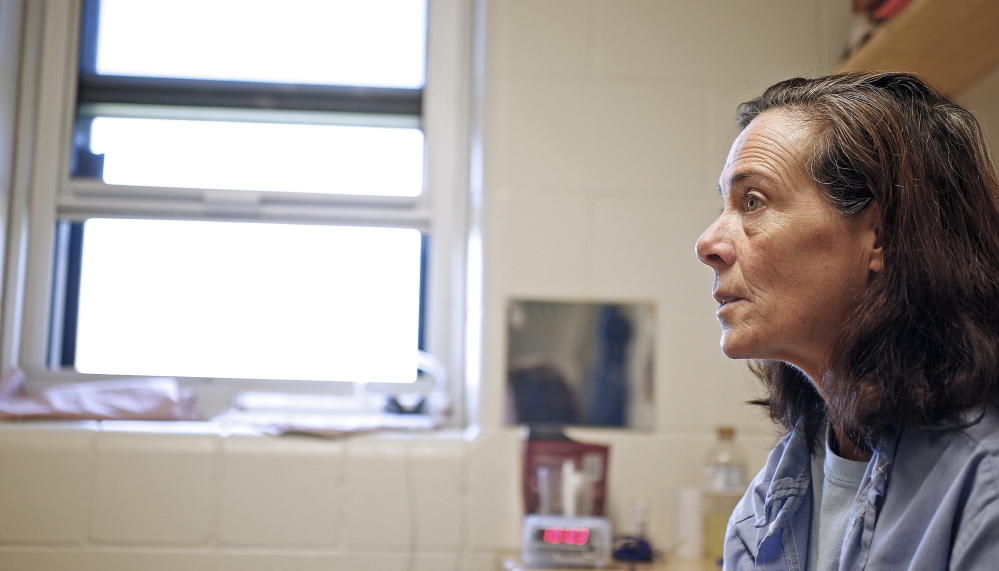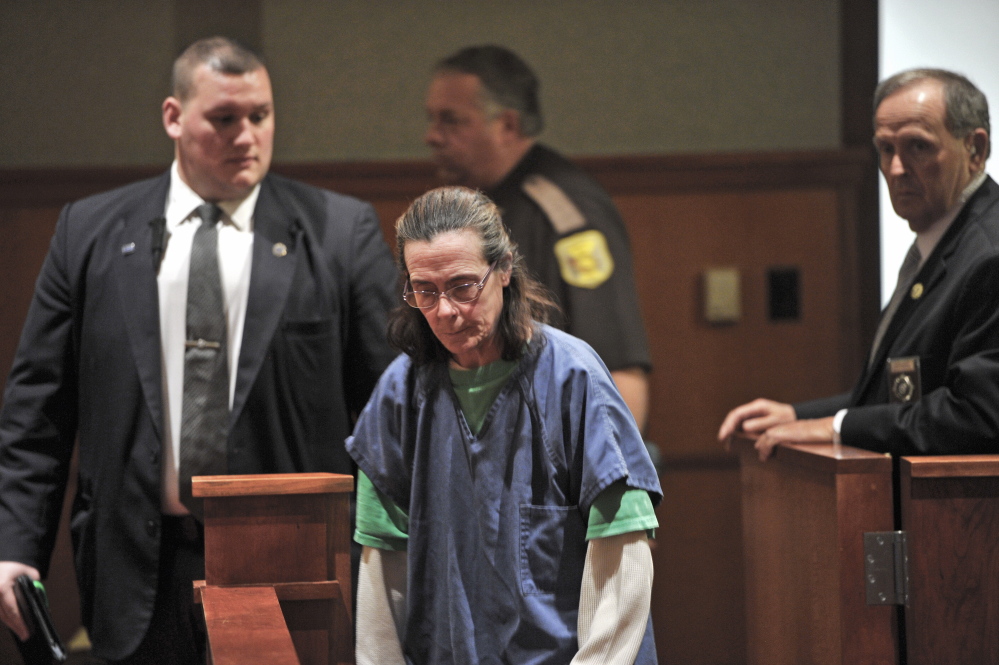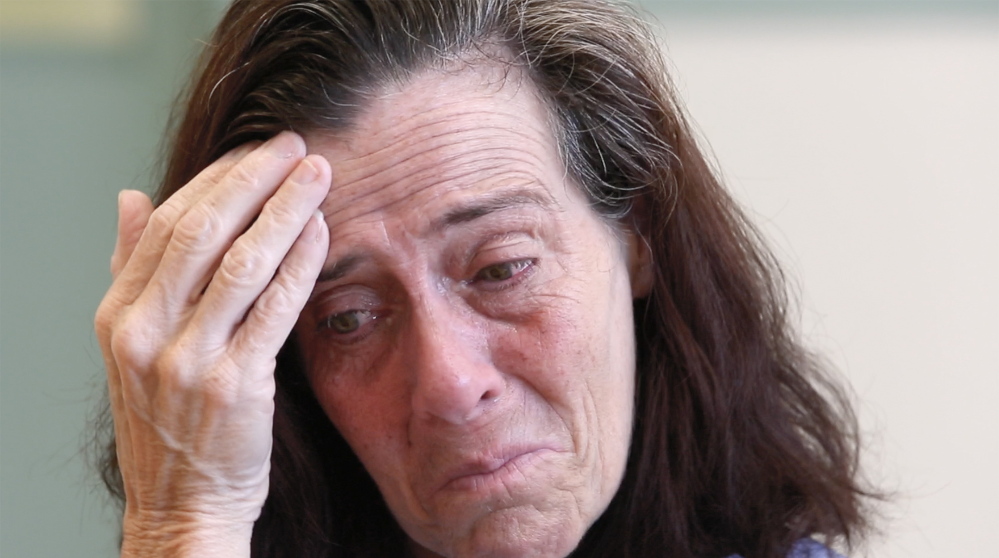Here’s a question that Kelly Boyer can’t answer, no matter how many times or how many ways you ask:
Why didn’t she learn from her mistakes? Why, over the span of 23 years, did she drive drunk over and over and over again, despite repeatedly getting caught?
“I can’t give a concrete answer, because there isn’t one,” Boyer says. “It’s insane. It’s insanity.”
On the night of Jan. 10, Boyer, 52, was arrested for the eighth time for operating under the influence. She had graduated from York County drug court just three weeks before.
She had been helping cater an event at a golf club when she reached for a drink and, eventually, for her car keys. Police spotted her driving erratically on East Grand Avenue in Scarborough. Boyer says she was on the phone with her Alcoholics Anonymous sponsor when she saw the flashing blue lights in the rearview mirror of her Jeep. Tests showed her blood alcohol level was twice the legal limit.
With her latest conviction, Boyer joins an exclusive club with a sorry distinction: An analysis last year by the Portland Press Herald found that 58 people had eight OUI convictions between 1982 and 2013 – a period in which 115,794 people were convicted of operating under the influence. The analysis also found that more than 5,000 people who have been convicted four or more times for drunken driving eventually had their driving privileges reinstated.
Like most other states, Maine lacks a provision to revoke a repeat offender’s license for life. But a new law that took effect Aug. 1 lets judges consider all felony drunken driving convictions on a person’s record in sentencing rather than limiting that look-back period to 10 years.
Boyer – whose license has been suspended or revoked 24 times since 1983, including suspensions for the eight OUI convictions – was sentenced before that law went into effect and would have faced a maximum of 364 days in jail. But the judge sentenced her on a second count, a felony charge of aggravated operation of a motor vehicle after her license had been revoked, and for active probation cases dating back to 2007 for which Boyer still faced suspended jail terms. The final tally: seven years in prison.
SPIRAL INTO ALCOHOLISM
Boyer sits on a plastic chair in an empty classroom in the women’s unit at the Maine Correctional Center in Windham, her home until 2021. (She’s appealing her sentence, arguing that it’s too harsh.) She wears a blue prison uniform that seems too big for her small frame.
“My family has been ripped apart by this whole thing,” she says. “My parents are in their 80s, and they’re watching me sit here for seven years.”
After watching her unravel for almost 30.
“All those years,” says her mother, Kathryn, 82, “and everything she’s been through and what she put the family through.”
Kathryn Boyer says she wishes the state had taken away her daughter’s license for good a long time ago.
“Why didn’t they take her license away so she couldn’t drive,” she says, “so that we could sleep nights.”
Boyer grew up in Portland, one of six kids in what she describes as an active, close-knit Catholic family. She says as a child she was sheltered and naive, a dreamer. In the caption underneath her senior yearbook picture it says that her future plans include “college and happiness.” It also says she can be found “doing things I shouldn’t.”
That behavior has come to define her adult life.
Shortly after graduating from high school, Boyer moved to California to live with a family friend.
“I was sexually assaulted out there,” Boyer says. “And that’s when my life changed totally.”
She says the man who raped her was an acquaintance of her roommate. She was too ashamed to tell anyone what had happened. Instead, she called her parents and told them she wanted to come home.
“I had no idea what to do,” she says. “That stuff didn’t happen in my world, where I grew up.”
Boyer says when she got back to Maine she took some college courses, got a job waitressing on the Portland waterfront, and started drinking to numb the pain and the shame. It was the beginning of a spiral into alcoholism.
She cites a litany of other issues over the years that fueled her need for alcohol. A diagnosis of post-traumatic stress disorder and bipolar disorder. Anxiety and depression.
She drank to cope. She drank to forget. She almost always drank alone.
“I worked hard,” says Boyer, “and I always tried to make things appear better than they were, you know, so no one would ask any questions. So you hide behind the mask pretty much.”
‘I KNEW THAT I HAD A PROBLEM’
When she was 25, she married a man she met while working as a lab technician at Maine Medical Center. For a while, she says, she managed to hide her drinking from him, too.
But there was no hiding the OUIs.
Her first was in 1991, when she was 29. She was on the way home from work and stopped at the Bramhall Pub in Portland for a few drinks.
That first arrest wasn’t a red flag.
“I didn’t think it would happen again,” Boyer says.
But it did.
“My second OUI is when I knew that I had a problem,” she says, “and my second OUI is when I told my husband what happened to me.”
She says he urged her to get counseling and did all he could to help her. She tried talking with a therapist but says she was “too raw.” After four years of marriage, her husband – a policeman – left.
“He said to me, ‘I can’t watch you die.’ ”
Between 1991 and 2002, Boyer racked up five OUIs. There was another conviction in 2003. Eight years later, in 2011, she was arrested for her seventh offense. Number eight was in January. The one saving grace, she says, is that she never hurt anyone.
Boyer says when she drinks, which is usually at home, she reaches a point where she suddenly feels “closed in” and has an overwhelming desire to “flee.”
“Every time that I have been picked up for OUI,” she says, “I have been on my way to go to the beach, to my serenity place. Because my short-term disconnect automatically says, ‘I need to get out of here, I need to go, I need to go,’ and I grab the keys.”
Boyer describes her own behavior as “Jekyll and Hyde,” and her mother says that although her daughter has gotten help for substance abuse, she was never treated for her mental health issues. “She’s like two personalities in one.”
‘I DON’T SEE HER AS A CRIMINAL’
Maine Secretary of State Matthew Dunlap, who oversees the Bureau of Motor Vehicles, says explanations are irrelevant when it comes to drunken driving.
“Whatever the condition or the excuse is,” Dunlap says, “I have to deal with the aftermath.”
And the aftermath can be heartbreaking.
“If you have some of the conversations I’ve had with families of people killed by drunk drivers,” Dunlap says, “your level of sympathy drops dramatically.”
Boyer has been in rehab four times. She’s had some extended periods of sobriety. Sooner or later, though, she relapses.
“She is a victim of the disease called alcoholism,” says her former attorney, Christian Foster. “I don’t see her as a criminal. I see her as a person who has an illness, like cancer or diabetes.”
The American Medical Association recognized alcoholism as a disease in 1956. George Koob, director of the National Institute on Alcohol Abuse and Alcoholism at the National Institutes of Health, says there are serious neurological consequences when a person drinks to excess.
“You start triggering all kinds of neurochemical changes,” Koob says, “that impair the frontal cortex of the brain – the part of your brain that makes decisions and controls impulse and inhibition.”
But not every person with an alcohol dependency drinks and drives.
SEEKING ‘PEACE AND SERENITY’
For Kelly Boyer, the two go hand in hand. For her, there’s only one solution.
“I can’t pick up the first drink,” she says.
If she does, she’ll probably drink and drive. Again.
“It’s like when you dance with the devil,” Boyer says, “you get burned.”
She has a lot of time now, sitting in the brick prison on a hill, to let that message sink in.
“I used to be happy. … I know what recovery is like, and that’s what keeps me going,” she says, wiping away tears. “That’s what I’m looking for, is peace and serenity and to just be able to hold my head high and not have everybody look at me and think that I’m a monster.”
But that’s an image she may never shake, and she knows it.
“I made a very poor choice over and over and over again,” she says, sobbing, “and if I could just take that back I would, but I can’t. … It’s ruined my life.”
Boyer takes a deep breath and covers her face with her hand.
“And I have no one to blame for that but me.”
Send questions/comments to the editors.






Success. Please wait for the page to reload. If the page does not reload within 5 seconds, please refresh the page.
Enter your email and password to access comments.
Hi, to comment on stories you must . This profile is in addition to your subscription and website login.
Already have a commenting profile? .
Invalid username/password.
Please check your email to confirm and complete your registration.
Only subscribers are eligible to post comments. Please subscribe or login first for digital access. Here’s why.
Use the form below to reset your password. When you've submitted your account email, we will send an email with a reset code.